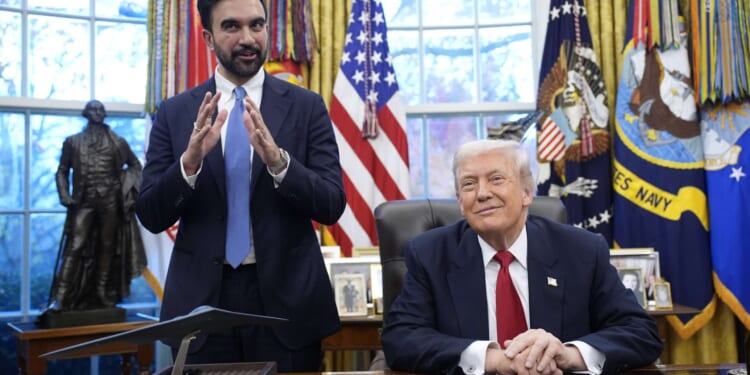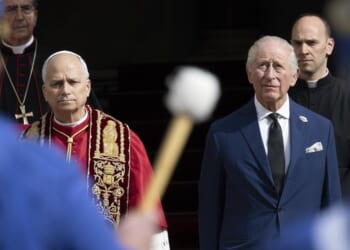About five years ago, the comedian Ryan Long posted a video in which a woke progressive and an old-fashioned racist meet and, much to their astonishment, discover that rather than being bitterly opposed, they agree on pretty much everything.
There was a strong echo of that convergence in last week’s White House tete-a-tete between Republican President Donald Trump and New York’s new socialist Mayor-elect Zohran Mamdani. Anticipated to be a grudge match, it instead turned into something of a lovefest. Well, of course it did. As fans of horseshoe theory accurately point out, control freaks from the political extremes might differ on details, but they have more in common with each other than they do with people who respect each other’s liberty.
You are reading The Rattler from J.D. Tuccille and Reason. Get more of J.D.’s commentary on government overreach and threats to everyday liberty.
In reporting on the meeting, The Hill noted, “Trump and Mamdani answered questions from reporters, both striking a remarkably cordial tone, with the president indicating he agreed with many of the mayor-elect’s ideas.”
According to Mamdani, “It was a productive meeting focused on a place of shared admiration and love.”
Trump added that Mamdani would be “hopefully a really great mayor.” He also commented, “There’s no difference in party. There’s no difference in anything.”
So, how did two politicians who entered the meeting slinging epithets at each other like “communist” and “fascist” exit with the makings of a mutual admiration society? There’s a hint in a question a BBC reporter posed to the new mayor at the White House when he commented “you’re both populist” and asked, “to what extent the president’s campaign…inspired any part of your campaign?”
Mamdani eagerly brought up cost-of-living and economic concerns while Trump nodded and then chimed in with agreement about concerns over the price of energy.
That’s the key to this meeting of the minds. Trump and Mamdani are strongly focused on economic issues. They also share a taste for addressing those concerns with government direction.
Mamdani boasts of his open socialism. He’s gone so far as to call for “seizing the means of production.” He won office with a campaign that promised city-run grocery stores, a rent freeze, and free buses, child care, and other services funded by higher taxes on whoever can be interpreted as “wealthy.” That should be interesting since he wants to tax the extremely wealthy out of existence.
In an exercise of what can be called “Republican socialism,” Trump actually did seize a portion of the means of production when his administration leaned on U.S. Steel for a “golden share” of the company. Under his leadership, the federal government has also taken ownership positions in firms including Intel, Lithium Americas, and Trilogy Metals. Trump’s protectionism is crafted to enable the state to push firms to revive domestic manufacturing—or else.
Mamdani believes in government control of the economy for the sake of achieving socialism. Trump endorses government control of the economy to accomplish his nationalist goals. But whatever they call their views, both men think political leaders should be directing economic activity.
What brought Mamdani to socialism is probably best left as a question for his shrink, his parents, and his college professors. But Trump’s path to state control of the economy almost certainly lies in his nationalist impulses. He came to office on the slogan “Make America Great Again” and has enthusiastically used the power of the federal government to enact what he believes that means, often replacing individual choice with politicians’ preferences.
As the economist Friedrich Hayek wrote in his 1960 book, The Constitution of Liberty, “It is this nationalistic bias which frequently provides the bridge from conservatism to collectivism. To think in terms of ‘our’ industry or resource is only a short step away from demanding that these national assets be directed in the national interest.”
Hayek differentiated nationalism from patriotism, which he considered pride in your origins as opposed to nationalism’s collectivism and xenophobia. The shared collectivism of socialism and nationalism, he added, is why “we frequently find the conservatives joining hands with the socialists against the liberals.”
Whether collectivist economic impulses are exercised by nationalists or by socialists, Hayek observed that the result is inevitably authoritarian. When the state controls economic activity, it can deny permits, withhold resources, cut off finance, impose punitive taxes, and otherwise make existence independent of the state almost impossible.
“Economic control is not merely control of a sector of human life which can be separated from the rest; it is the control of the means for all our ends,” Hayek warned in his 1944 book, The Road to Serfdom. “And whoever has sole control of the means must also determine which ends are to be served, which values are to be rated higher and which lower, in short, what men should believe and strive for.”
From different directions, Trump and Mamdani have arrived at agreement that economic activity should be directed by government officials over the objections of those who want to make their own decisions about their property, their businesses, and their money. They got along so well together at the White House because, like Ryan Long’s fictional wokester and racist, they were delighted to discover the similarities in their desires for a society controlled from the top.
Yes, Mamdani is back to calling Trump a “fascist,” but there’s a quality of rote recital to it. He’s giving his supporters what they expect. Trump will probably call him a communist again. But they’re not bitter enemies; the two men are rivals peddling similar products and vying for market share.
In opposition to both these representatives of neighboring arms of the ideological horseshoe are Hayek-style classical liberals, libertarians, and other individualists. Advocates of liberty oppose collectivism and state control whether it’s called socialism, nationalism, or some other name. We see society as a cooperative endeavor among free individuals, not as a collective to be commanded from above.
Unfortunately, Mamdani and Trump represent political movements that are consuming their respective political parties. If they’re successful in displacing the remaining relatively individualistic voices, the political choices offered in the future by the major parties will be nothing more than competing brands of collectivism. Of course, collectivists favor a world in which choices are made for us.

















